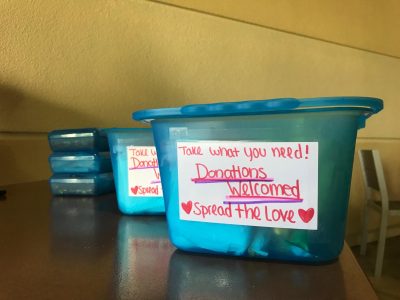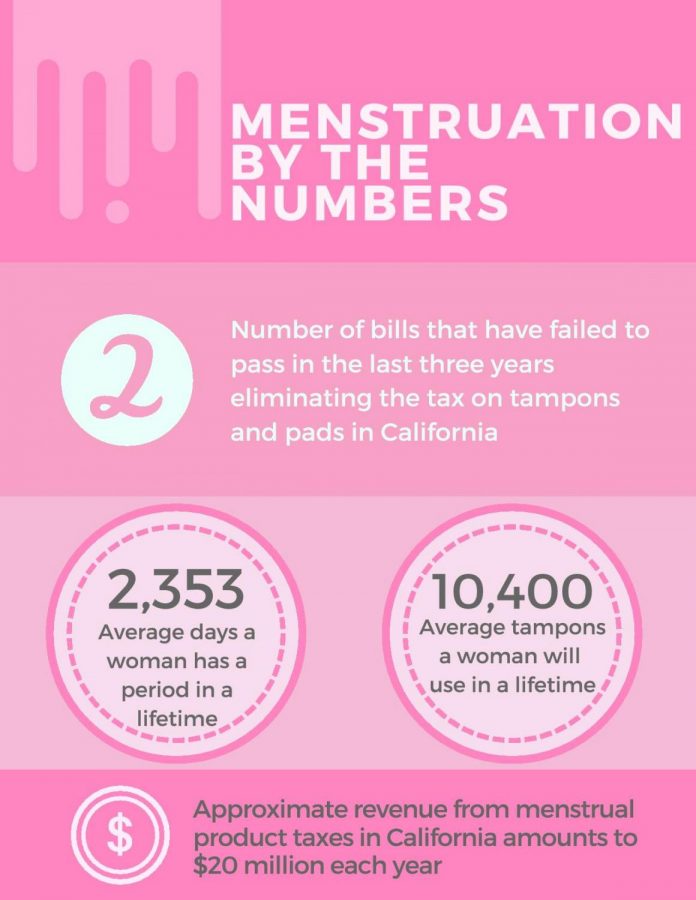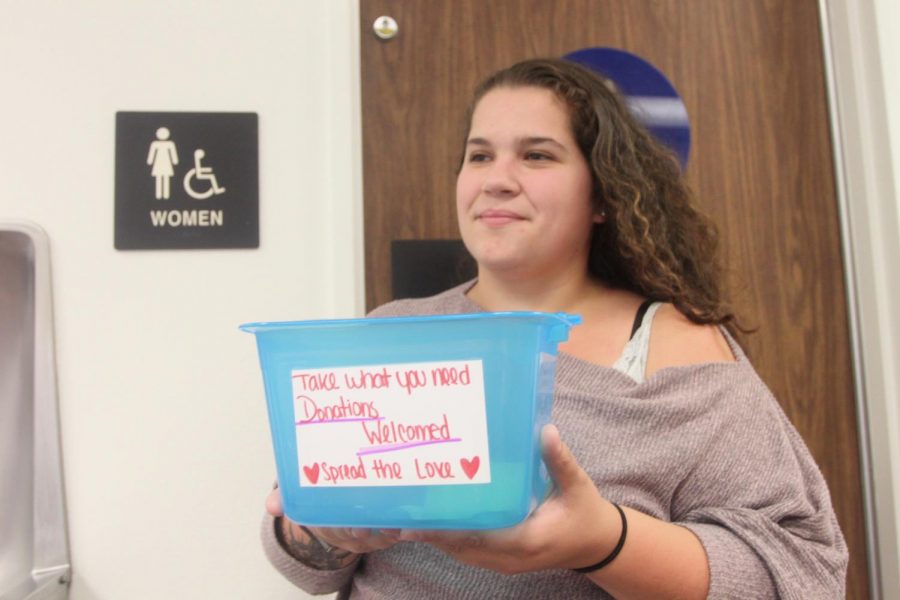Sac State students supply free menstrual products on campus
Through student-run initiative ‘Mother Nature’s ‘Gift,’’ students placed boxes supplying free tampons across campus.
Magherita Beale -The State Hornet
Ethnic studies major Elizabeth Winn holds a box containing free menstrual products outside of a fourth floor bathroom in the Library. Winn and child development major Cassandra Lopez started “Mother Nature’s ‘Gift'” together.
October 2, 2018
After finding a tin box filled with free menstrual products in a Eureka Hall bathroom, Sacramento State students Elizabeth Winn and Cassandra Lopez decided to take charge.
A flyer and an Instagram page later, Winn and Lopez have started “Mother Nature’s ‘Gift,’” a student-led group with the goal of providing free menstrual products to Sacramento State students in the form of stocked plastic boxes spread in bathrooms across campus.
Signs on the boxes encourage people to take what they need and to donate what they can.
“These are necessities. Toilet paper is free. (Menstrual products) are the last thing we want to think about, like having extra tampons in our backpacks,” Winn, an ethnic studies major said. “It’s not fair that condoms are free but we can’t get feminine products.”
Lopez, a child development major, found the original box in a second-floor bathroom of Eureka Hall labeled with a Post-It note reading, “Free. Please be mindful of others.” She said she still doesn’t know who placed that first box there.
After finding the box, Lopez posted a picture of it on Sac State’s Transfer Navigation Team Facebook page.
“I wasn’t even going to post it, but it’s a good resource for everyone, because I’ve been there and I’ve been like, ‘What do I do now?’,” Lopez said
Since Sept. 24, Lopez has teamed up with Winn and the two have placed boxes of their own in five different locations on campus.
“We definitely want to mark them on the location,” Winn said. “When you’re thinking about restrooms you think, ‘OK, what’s the cleanest restroom I can use? What do they have? Do they have extra things?’ We’re hoping that if someone were to take something tomorrow, they would have the resources to replenish it next week.”
Lopez said that many of the bathrooms on campus don’t have tampon and sanitary napkin dispensers and the ones that do are usually empty.
RELATED: Sac State’s feminine hygiene product shortfall
Winn reached out to Kotex and other name-brand menstrual product companies for sponsorships and said she is waiting to hear back from them.
After the Facebook post was made, Associate Vice President for Student Affairs and Dean of Students Beth Lesen, who also provides leadership for the Women’s Resource Center among others, reached out to the two of them.
“I asked her if she had any kind of flyer or graphic to send to me,” Lesen said. “I posted it on my personal Instagram and I’ve talked with the university’s communications about putting it on the Sac State Instagram.”
Lesen also said that she called facilities to ensure that the custodians didn’t mistake the boxes for trash.

Elizabeth Winn, an ethnic studies major, and Cassandra Lopez, a child development major, took the initiative to fill boxes with menstrual products to put in bathrooms across campus. Winn and Lopez teamed up after finding a tin box in a second-floor bathroom in Eureka Hall Monday.
“This is really beautiful, that these students are feeling called to do something giving for other students and it’s so organic in the way it’s developing,” Lesen said. “I was really touched.”
As of now, there are three locations at Sac State that provide free menstrual products: the University Union information desk, the Women’s Resource Center and The WELL.
On a state level, Assemblymember Cristina Garcia (D-Bell Gardens) has been at the forefront of the legislative effort to provide either free or tax-free menstrual products.
Garcia successfully passed California Assembly Bill 10 last October, which requires schools with sixth to 12th grades, and with at least 40 percent of students under the federal poverty line to stock menstrual products in half of the restrooms, Garcia said.
While AB10 originally included college campuses, Garcia said during the negotiation process, the bill was narrowed down to secondary schools.
She also said that the bill left the menstrual products gender neutral and that it’s up to the eligible schools to decide how to identify those bathrooms.
“We definitely think it should be available anywhere,” Garcia said. “It should be like toilet paper that is available in all bathrooms, whether it’s low income or not. At the end of the day, we’ve all had an emergency and we’ve all had to walk around with a stain in our clothes.”
Garcia has introduced two assembly bills that would end the tax on menstrual products. The latest, AB 9, died in the Assembly Appropriations Committee last year while the first of the two, AB 1561, reached Gov. Jerry Brown’s desk unanimously in 2016, only for Brown to veto the bill.

Statistics and data gathered from reporting, New York Times and the Reusable Menstrual Cups website.
Garcia said that the governor has said that getting rid of the tax on menstrual products would eliminate $20 million from the state’s general fund. She added that the budget is $170 billion, making the tax revenue generated from menstrual products a small percentage.
“I think that’s a weak answer, personally,” Garcia said. “I think we can do without those dollars and I think that those dollars should stay in the pockets of the individuals who need them. Being born with a uterus shouldn’t be used as an excuse to balance our budget. Our budget is a representation of our values.”
Garcia said she hopes that with a new governor next year, her team will have better results. She said she plans to introduce a new bill next year when the new legislative cycle begins.
“I feel like it’s so unnecessary to tax us for something that we don’t choose to happen to us. It happens to every woman out there,” Lopez said.
Students can also help raise awareness about the issue, Garcia said. While she said it’s a continued discussion, students can help by sharing their stories and their experiences.
“This is our biology and it’s nothing to be ashamed of or grossed out by it,” Garcia said. “When [students] are around administrators and student government they [should] push the issue and put it on the agenda. Every campus has a student government and they are the arm that has access to the decision makers on campus. Lobbying them is important.”
Interactive map created by Mike Yun































































































































Dee Tox • Oct 3, 2018 at 11:17 am
Perhaps this column should also mention Cristina Garcia is an alleged sex harasser.
Also she used racist and homophobic language in her workplace.
Is she a fit person to be campaigning on this issue?